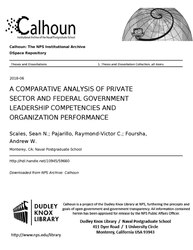File:A COMPARATIVE ANALYSIS OF PRIVATE SECTOR AND FEDERAL GOVERNMENT LEADERSHIP COMPETENCIES AND ORGANIZATION PERFORMANCE (IA acomparativeanal1094559660).pdf

Original file (1,275 × 1,650 pixels, file size: 1.11 MB, MIME type: application/pdf, 66 pages)
Captions
Captions
Summary[edit]
| A COMPARATIVE ANALYSIS OF PRIVATE SECTOR AND FEDERAL GOVERNMENT LEADERSHIP COMPETENCIES AND ORGANIZATION PERFORMANCE
( |
||
|---|---|---|
| Author |
|
|
| Title |
A COMPARATIVE ANALYSIS OF PRIVATE SECTOR AND FEDERAL GOVERNMENT LEADERSHIP COMPETENCIES AND ORGANIZATION PERFORMANCE |
|
| Publisher |
Monterey, CA; Naval Postgraduate School |
|
| Description |
As the world becomes more complex and evolves at faster rates, it has become imperative that organizations evolve their leadership training to adapt to the ever-changing industrial environment and maintain the organization’s competitive advantage. For example, the Department of the Navy has called for cultural changes and programmatic improvements to the way the civilian workforce is prepared for leadership roles and responsibilities. Patricia Ingraham, Heather Getha-Taylor, and the National Academy of Public Administration have conducted studies that identified the current level of training and developing civilian leadership is ineffective within the federal government regarding organizational requirements in an exponentially changing complex environment. If the current approach to leadership development is insufficient, an important question to study is, “What leadership capabilities, qualities and competencies contribute to effective leadership and organizational effectiveness in complex environments of defense acquisition?” By answering this question, we hope to offer suggestions and recommendations to improve leadership development in the Navy Civilian Acquisition Workforce. Subjects: Complexity Leadership Theory; Dynamic Capabilities; adaptive space; social capital; complex adaptive system; knowledge-based |
|
| Language | English | |
| Publication date | June 2018 | |
| Current location |
IA Collections: navalpostgraduateschoollibrary; fedlink |
|
| Accession number |
acomparativeanal1094559660 |
|
| Source | ||
| Permission (Reusing this file) |
This publication is a work of the U.S. Government as defined in Title 17, United States Code, Section 101. Copyright protection is not available for this work in the United States. | |
Licensing[edit]
| Public domainPublic domainfalsefalse |
This work is in the public domain in the United States because it is a work prepared by an officer or employee of the United States Government as part of that person’s official duties under the terms of Title 17, Chapter 1, Section 105 of the US Code.
Note: This only applies to original works of the Federal Government and not to the work of any individual U.S. state, territory, commonwealth, county, municipality, or any other subdivision. This template also does not apply to postage stamp designs published by the United States Postal Service since 1978. (See § 313.6(C)(1) of Compendium of U.S. Copyright Office Practices). It also does not apply to certain US coins; see The US Mint Terms of Use.
|
 | |
| This file has been identified as being free of known restrictions under copyright law, including all related and neighboring rights. | ||
https://creativecommons.org/publicdomain/mark/1.0/PDMCreative Commons Public Domain Mark 1.0falsefalse
File history
Click on a date/time to view the file as it appeared at that time.
| Date/Time | Thumbnail | Dimensions | User | Comment | |
|---|---|---|---|---|---|
| current | 21:07, 13 July 2020 |  | 1,275 × 1,650, 66 pages (1.11 MB) | Fæ (talk | contribs) | FEDLINK - United States Federal Collection acomparativeanal1094559660 (User talk:Fæ/IA books#Fork8) (batch 1993-2020 #5157) |
You cannot overwrite this file.
File usage on Commons
The following page uses this file:
Metadata
This file contains additional information such as Exif metadata which may have been added by the digital camera, scanner, or software program used to create or digitize it. If the file has been modified from its original state, some details such as the timestamp may not fully reflect those of the original file. The timestamp is only as accurate as the clock in the camera, and it may be completely wrong.
| Author | Raymond Pajarillo |
|---|---|
| Short title | A COMPARATIVE ANALYSIS OF PRIVATE SECTOR AND FEDERAL GOVERNMENT LEADERSHIP COMPETENCIES AND ORGANIZATION PERFORMANCE |
| Date and time of digitizing | 09:38, 5 June 2018 |
| Software used | Microsoft® Word 2016 |
| File change date and time | 06:32, 10 July 2018 |
| Date metadata was last modified | 06:32, 10 July 2018 |
| Conversion program | Microsoft® Word 2016 |
| Encrypted | no |
| Page size | 612 x 792 pts (letter) |
| Version of PDF format | 1.4 |

